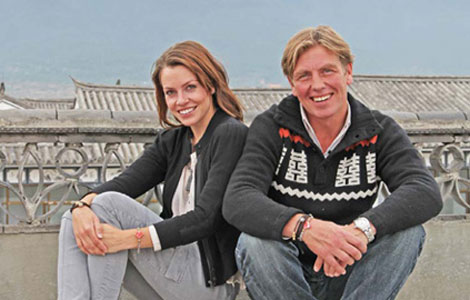Editorials
G8 should fulfill pledges
Updated: 2011-05-31 07:27
(China Daily)
As leaders of the Group of Eight (G8) industrialized nations wrapped up a two-day summit in Deauville, France, they made new promises of billions of dollars for Arab states in support of their political transition and growth efforts.
However, considering the poor record of the G8 in fulfilling its international aid promises over the past years, it is debatable whether the huge sum will be delivered in time and in full.
At the 2005 Gleneagles G8 meeting, the group promised an extra $50 billion to the poorest countries to help fight poverty and disease, with about $30 billion of that to go to Africa by 2010. But according to the assessment by the Organization for Economic Cooperation and Development (OECD), the development aid of G8 in 2010 was $19 billion short of the 2005 targets.
| ||||
The new aid package may be timely, but the statement did not provide breakdowns of how much aid each G8 country will provide, nor when the funds will be put in place.
Worse still, there are growing concerns that the group's new aid promises for the Arab world might risk detracting attention from the existing commitments to the poorest in the world, especially in Africa.
As Save the Children's Adrian Lovett put it: We don't want an Arab Spring to be followed by a long African winter.
Of course, the G8 countries still offer the majority of global development funds, but though still enjoying the reputation as a "rich club", G8 members today are not in their best financial shape.
However, the G8's aid programs should be planned out of genuine humanitarian values, rather than from promotion of realpolitik.
In essence, by launching the "Deauville Partnership" with the Arab world - of traditional geopolitical significance - the group is seeking to promote their desired change toward Western-style regimes, and strengthen the West's influence in North Africa and the Middle East.
With the collective rise of emerging economies, the Group of 20 (G20) is gradually replacing the G8 in dealing with a number of global challenges.
If the G8 wants to make a difference with their relatively declining strength and global dominance, the group should, while making new promises, first fully deliver on their past development, health and hunger pledges, and make up the existing default to win the trust of the world.
(China Daily 05/31/2011 page8)
E-paper

Tapping into the future
Foreign companies are investing in China's water industry as many predict a growing profit margin.
Headhunters ride on growth
Commercial property rides wave
Learning from the past
Specials

Cuisine central
London's Chinatown is helping diners appreciate full palate of Chinese food

Tying the knot
Danish couple's high-end macrame export business takes off in the mountains of Yunnan.

Truly a super woman
Li Yuchun first came to prominence in 2005 as the Super Girl winner, and since then has become an international star.




